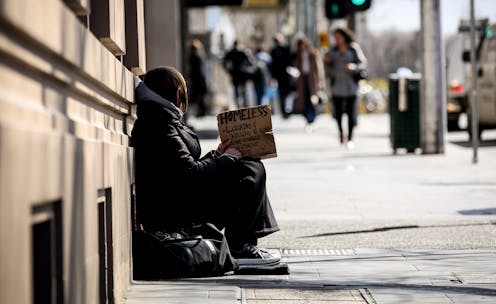'We all slept in the car, five of us'. Young refugees talk about being homeless in Australia
- Written by Jen Couch, Senior Lecturer – Youth Work and International Development, Australian Catholic University

One of the biggest challenges young people of refugee background face in their new country is finding safe, affordable and appropriate housing. Yet this is central to social inclusion and to a young person’s ability to settle successfully in Australia.
In the first longitudinal study of the lives of young homeless refugees I looked at 25 such people in Melbourne. They shared with me their experiences of being homeless and their pathway out of it over a five-year period. For a majority of them, their homelessness ended through a connection made by a member of their own cultural community.
Young refugees are at high risk of homelessness – “at least six to 10 times higher” than for Australian-born young people, a 2002 study estimated. (This is the most recent available study on this.)
Read more: Youth homelessness efforts get a lowly 2 stars from national report card
Insecure housing is, in turn, one of the most significant predictors of mental health problems among refugees.
The beginnings of homelessness
Family breakdown is a well-documented pathway into homelessness for all young people.
Read more: Family break-up raises homelessness risk, and critical period is longer for boys
But for young refugees there are specific circumstances that complicate family relationships and cause tension.
Participants talked about living in severely overcrowded housing, moving constantly and often being expected to help other family members negotiate a new language, culture and systems. This required them to step up into “adult” roles.
Congolese male, age 17, homeless 18 months, said:
It was very very hard. You think before you come that the moving is over. But then in the first two years we moved six times.
At one point we all slept in the car, five of us. I just kept moving schools and I had no friends. I had no lunch at school because we had no kitchen.
South Sudanese male, 18, homeless two years, said:
Eventually we got a house, but after a while my dad started going crazy. And then he got fired from his job. There was no food in the house and once again, we were hungry.
I quit school. I got a job and started trying to take care of my brothers. And it didn’t work. We lost the house and started moving.
Little knowledge of available help
Once young people left home, their options were limited. Most did not know about homelessness services. Many did not even identify as being homeless – they saw homeless people as old, male and rough sleepers.
Read more: What’s in the name 'homeless'? How people see themselves and the labels we apply matter
Very few tried to access youth refuges and shelters. Those who did said they were afraid and did not feel comfortable.
Private rental was unattainable for nearly all, due to cost, discrimination and a lack of rental history. Consequently, all young people found couch surfing was their only housing option.
Afghani male, 17, homeless two years, said:
After I left, I slept in all kinds of places. My school expelled me for not attending and didn’t even look to see that I was sleeping all over Melbourne.
And after that, now, I just move around and around. No school. No Work. No family. No home.
Young women reported a fear of sleeping rough. This led to several staying in inappropriate and exploitative environments because no suitable housing options were available to them.
They described unromantic and unwanted relationships, often with men older than them, that they entered into because of a lack of free choice and as a last resort.
South Sudanese female, 18, homeless three years, said:
With him at least I had somewhere to sleep. I was alone here, because I hadn’t been in Australia long and I had no idea where I could go. Where was I to go? I had no home.
Read more: 'Just a piece of meat': how homeless women have little choice but to use sex for survival
Ways out of homelessness
By the time the study ended in 2017, 23 of the 25 people had found a way out of homelessness. But one young person had taken their own life. Another was in jail.
For nearly two-thirds of the young people in this study, the transition out of homeless occurred through a connection made by a member of their own cultural community.
Liberian female, 20, homeless 18 months, said:
I met a Liberian lady on the train. She said, ‘Call me if you need anything.’ The first thing I said was, ‘I don’t know you and I hope one day I can give you something back, but right now I need some money for food.’
She came that day with three bags of food. She helped me so much and without her I would still have nowhere to live.
All young people who were helped in this way said one of the things they valued most was that they did not need to demonstrate and point out their resilience; it was just taken for granted.
Ethnic community members were far more likely to adopt a family-focused approach and try to reconnect the young people with their families.
This highlights the importance of these communities in supporting newly arrived people. With good knowledge of, and linkages to, other networks, they can help other community members get access to available supports and services and so play an effective role in supporting positive settlement.
Far from just providing housing, community support can increase young people’s agency, belonging, social connection and participation.
Authors: Jen Couch, Senior Lecturer – Youth Work and International Development, Australian Catholic University




